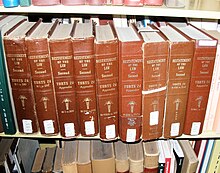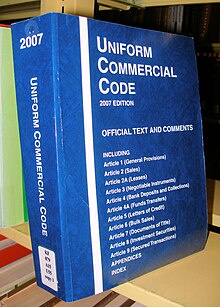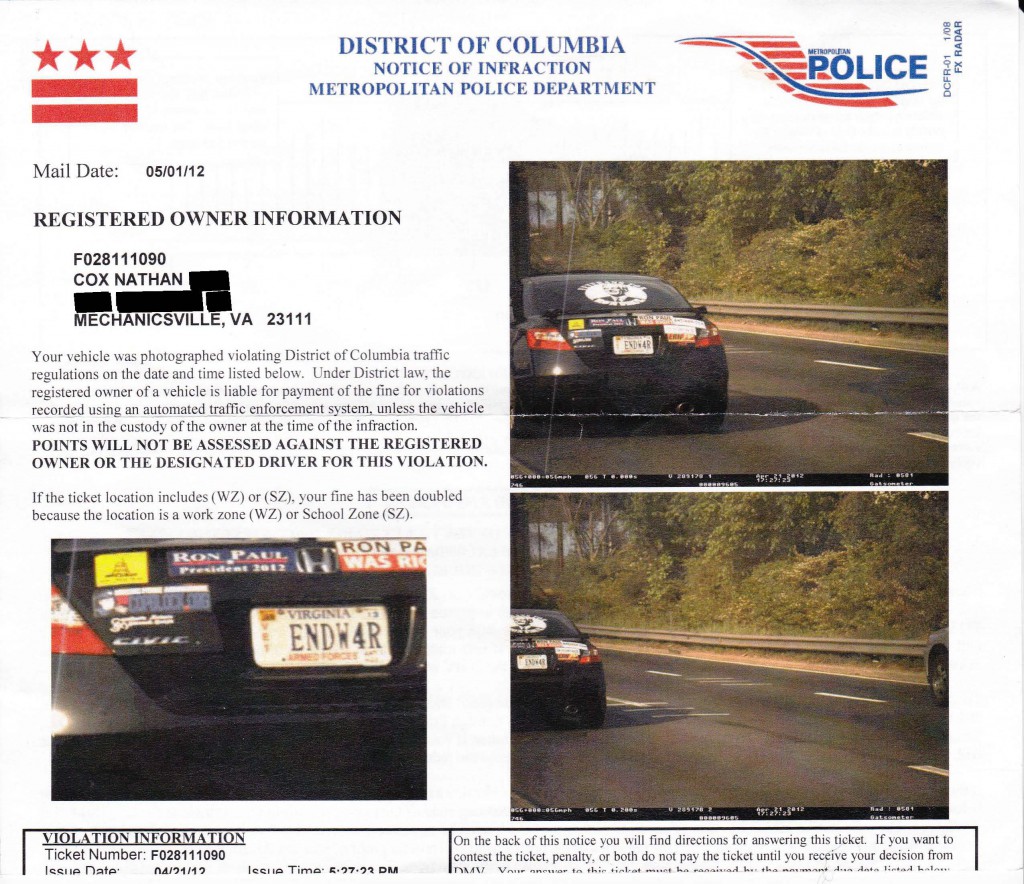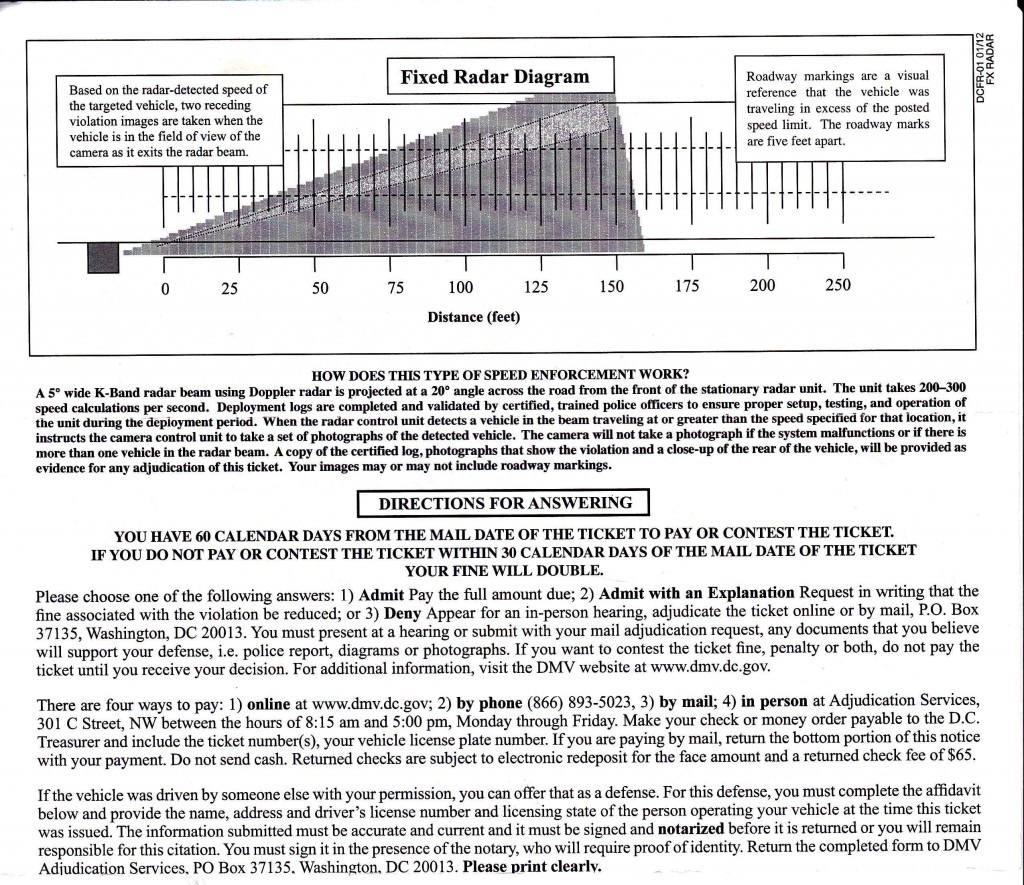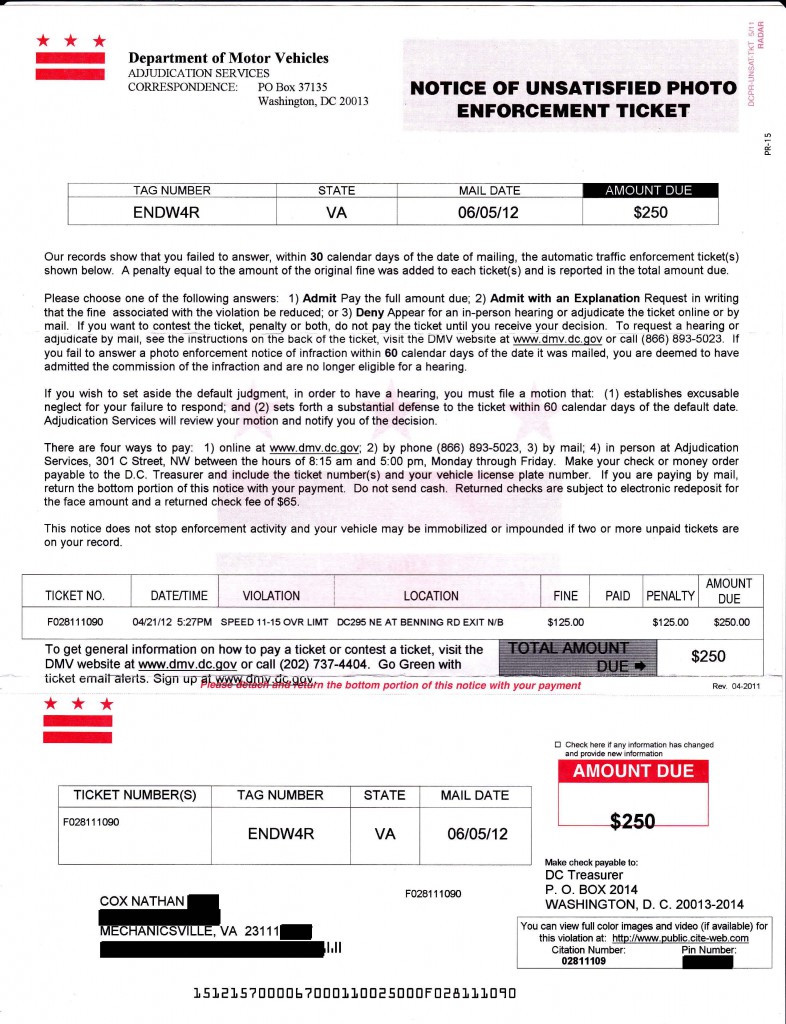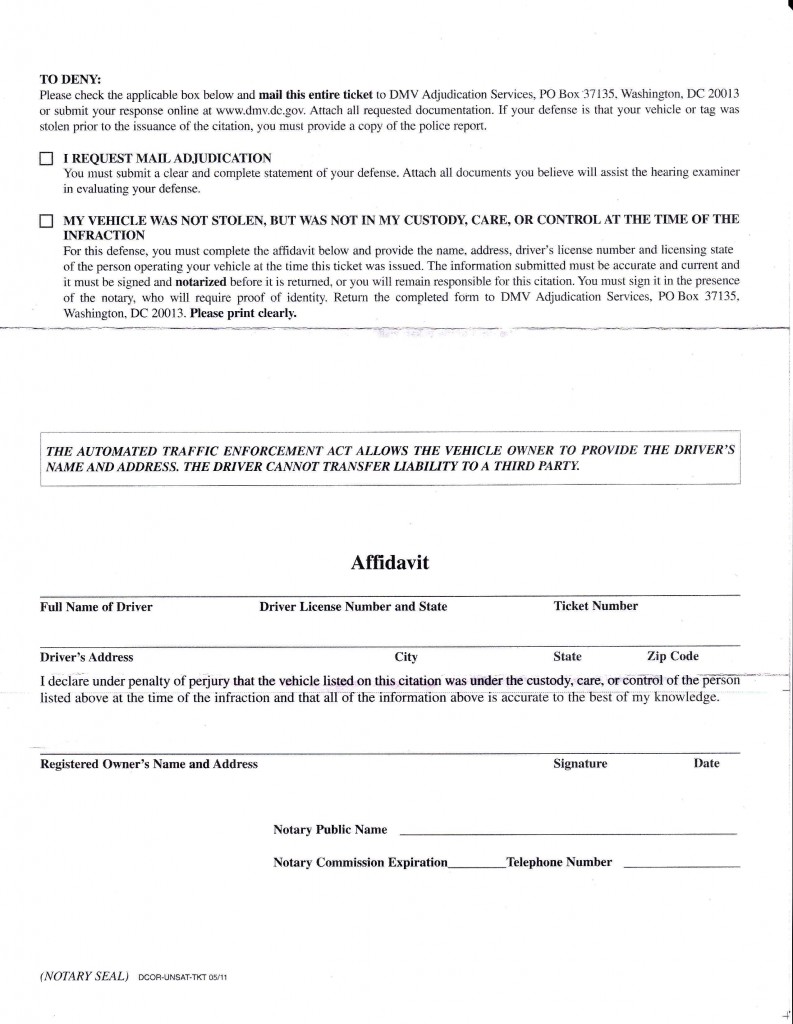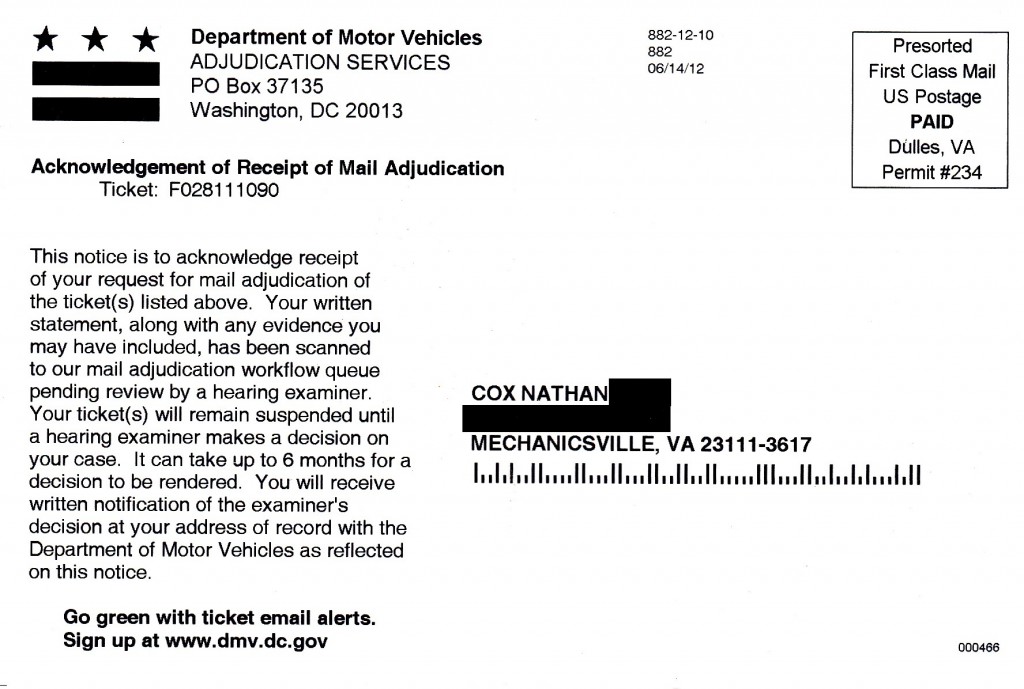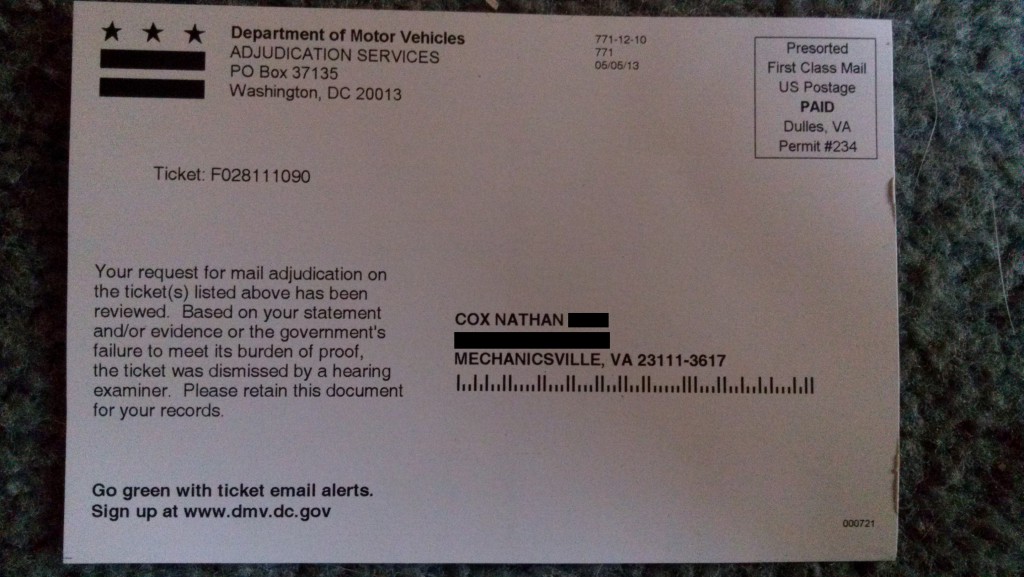The
law of the United States consists of many levels
[1] of codified and uncodified forms of
law, of which the most important is the
United States Constitution, the foundation of the
federal government of the
United States. The Constitution sets out the boundaries of
federal law, which consists of constitutional
acts of Congress, constitutional
treaties ratified by
Congress, constitutional regulations promulgated by the
executive branch, and
case law originating from the
federal judiciary.
The Constitution and federal law are the
supreme law of the land, thus preempting conflicting state and territorial laws in the fifty
U.S. states and in the territories.
[2] However, the scope of federal preemption is limited, because the scope of federal power is itself rather limited. In the unique dual-sovereign system of
American federalism (actually tripartite
[3] when one includes
Indian reservations), states are the
plenarysovereigns, while the federal sovereign possesses only the limited supreme authority enumerated in the Constitution.
[4] Indeed, states may grant their citizens broader rights than the federal Constitution as long as they do not infringe on any federal constitutional rights.
[5][6] Thus, most U.S. law (especially the actual "living law" of
contract,
tort,
criminal, and
family law experienced by the majority of citizens on a day-to-day basis) consists primarily of state law, which can and does vary greatly from one state to the next.
[7][8]At both the federal and state levels, the law of the United States was originally largely derived from the
common law system of
English law, which was in force at the time of the
Revolutionary War.
[9][10] However, U.S. law has diverged greatly from its English ancestor both in terms of substance and procedure, and has incorporated a number of
civil law innovations.
[edit]General overview
[edit]Sources of law
In the United States, the law is derived from four sources. These four sources are
constitutional law,
statutory law, administrative regulations, and the common law (which includes
case law).
[11] The most important source of law is the
United States Constitution. All other law falls under and are subordinate to that document. No law may contradict the Constitution..
[edit]Constitutionality
Where Congress enacts a statute that conflicts with the Constitution, the
Supreme Court may find that law
unconstitutional and declare it invalid.
[12]Notably, a statute does not disappear
automatically merely because it has been found unconstitutional; it must be deleted by a subsequent statute. Many federal and state statutes have remained on the books for decades after they were ruled to be unconstitutional. However, under the principle of
stare decisis, no sensible lower court will enforce an unconstitutional statute, and any court that does so will be reversed by the Supreme Court. Conversely, any court that refuses to enforce a constitutional statute (where such constitutionality has been expressly established in prior cases) will risk reversal by the Supreme Court.
[13][14][edit]American common law
The United States and most
Commonwealth countries are heirs to the
common law legal tradition of
English law.
[15] Certain practices traditionally allowed under English common law were expressly outlawed by the Constitution, such as
bills of attainder[16] and general search warrants.
[17]As common law courts, U.S. courts have inherited the principle of
stare decisis.
[18] American judges, like common law judges elsewhere, not only apply the law, they also make the law, to the extent that their decisions in the cases before them become precedent for decisions in future cases.
[19]The actual substance of English law was formally "received" into the United States in several ways. First, all U.S. states except Louisiana have enacted "
reception statutes" which generally state that the common law of England (particularly judge-made law) is the law of the state to the extent that it is not repugnant to domestic law or indigenous conditions.
[20] Some reception statutes impose a specific cutoff date for reception, such as the date of a colony's founding, while others are deliberately vague.
[21] Thus, contemporary U.S. courts often cite pre-Revolution cases when discussing the evolution of an ancient judge-made common law principle into its modern form,
[21] such as the heightened duty of care traditionally imposed upon
common carriers.
[22]Second, a small number of important British statutes in effect at the time of the Revolution have been independently reenacted by U.S. states. Two examples that many lawyers will recognize are the
Statute of Frauds (still widely known in the U.S. by that name) and the
Statute of 13 Elizabeth (the ancestor of the
Uniform Fraudulent Transfers Act). Such English statutes are still regularly cited in contemporary American cases interpreting their modern American descendants.
[23]However, it is important to understand that despite the presence of reception statutes, much of
contemporary American common law has diverged significantly from English common law.
[24] The reason is that although the courts of the various Commonwealth nations are often influenced by each other's rulings, American courts rarely follow post-Revolution Commonwealth rulings unless there is no American ruling on point, the facts and law at issue are nearly identical, and the reasoning is strongly persuasive.
Early on, American courts, even after the Revolution, often did cite contemporary English cases. This was because appellate decisions from many American courts were not regularly reported until the mid-19th century; lawyers and judges, as creatures of habit, used English legal materials to fill the gap.
[25] But citations to English decisions gradually disappeared during the 19th century as American courts developed their own principles to resolve the legal problems of the American people.
[26] The number of published volumes of American reports soared from eighteen in 1810 to over 8,000 by 1910.
[27] By 1879, one of the delegates to the
California constitutional convention was already complaining: "Now, when we require them to state the reasons for a decision, we do not mean they shall write a hundred pages of detail. We [do] not mean that they shall include the small cases, and impose on the country all this fine judicial literature, for the Lord knows we have got enough of that already."
[28]Today, in the words of Stanford law professor Lawrence Friedman: "American cases rarely cite foreign materials. Courts occasionally cite a British classic or two, a famous old case, or a nod to
Blackstone; but current British law almost never gets any mention."
[29] Foreign law has never been cited as binding precedent, but merely as a reflection of the shared values of Anglo-American civilization or even Western civilization in general.
[30][edit]Levels of law
[edit]Federal law
Federal law originates with the Constitution, which gives Congress the power to enact
statutes for certain limited purposes like regulating
interstate commerce. Nearly all statutes have been codified in the
United States Code. Many statutes give
executive branch agencies the power to create
regulations, which are published in the
Federal Register and codified into the
Code of Federal Regulations. Regulations generally also carry the
force of law under the
Chevron doctrine. Many lawsuits turn on the meaning of a federal statute or regulation, and judicial interpretations of such meaning carry legal force under the principle of
stare decisis.
In the beginning, federal law traditionally focused on areas where there was an express grant of power to the federal government in the federal Constitution, like the
military,
money,
foreign affairs (especially international
treaties),
tariffs,
intellectual property (specifically
patents and
copyrights), and
mail. Since the start of the 20th century, aggressive interpretations of the Commerce and Spending Clauses of the Constitution have enabled federal law to expand into areas like
aviation,
telecommunications,
railroads,
pharmaceuticals,
antitrust, and
trademarks. In some areas, like aviation and railroads, the federal government has developed a comprehensive scheme that preempts virtually all state law, while in others, like family law, a relatively small number of federal statutes (generally covering interstate and international situations) interacts with a much larger body of state law. In areas like antitrust, trademark, and
employment law, there are powerful laws at both the federal and state levels that coexist with each other. In a handful of areas like
insurance, Congress has enacted laws expressly refusing to regulate them as long as the states have laws regulating them (see, e.g., the
McCarran-Ferguson Act).
Under the doctrine of
Erie Railroad Co. v. Tompkins (1938), there is
no general federal common law. Although federal courts can create federal common law in the form of case law, such law must be linked one way or another to the interpretation of a particular federal constitutional provision, statute, or regulation (which in turn was enacted as part of the Constitution or after). Federal courts lack the
plenary power possessed by state courts to simply make up law, which the latter are able to do in the absence of constitutional or statutory provisions replacing the common law. Only in a few narrow limited areas, like maritime law,
[31] has the Constitution expressly authorized the continuation of English common law at the federal level (meaning that in those areas federal courts can continue to make law as they see fit, subject to the limitations of
stare decisis).
The other major implication of the
Erie doctrine is that federal courts cannot dictate the content of state law when there is no federal issue (and thus no federal supremacy issue) in a case. When hearing claims under state law pursuant to
diversity jurisdiction, federal trial courts
must apply the statutory and decisional law of the state in which they sit, as if they were a court of that state,
[32] even if they believe that the relevant state law is irrational or just bad public policy.
[33] And under
Erie, deference is one-way only: state courts are not bound by federal interpretations of state law.
[34]If this was not confusing enough, state courts are
not bound to follow judicial interpretations of federal law from the federal courts that sit in a state, including federal courts of appeals and district courts (that is, the intermediate appellate courts and trial courts).
[35] There is only one federal court that binds all state courts as to the interpretation of federal law and the federal Constitution: the U.S. Supreme Court itself.
[36][edit]Federal statutory enactment and codification
After the
President signs a bill into law (or Congress enacts it over his veto), it is delivered to the
Office of the Federal Register (OFR) of the
National Archives and Records Administration (NARA) where it is assigned a law number, and prepared for publication as a
slip law.
[37] Public laws, but not private laws, are also given legal statutory citation by the OFR. At the end of each session of Congress, the slip laws are compiled into bound volumes called the
Statutes at Large, and they are known as
session laws. The Statutes at Large present a chronological arrangement of the laws in the exact order that they have been enacted.
Public laws are incorporated into the
United States Code, which is a codification of all general and permanent laws of the United States. The main edition is published every six years by the
Office of the Law Revision Counsel of the
House of Representatives, and cumulative supplements are published annually.
[38][39] The U.S. Code is arranged by subject matter, and it shows the present status of laws with amendments already incorporated in the text that have been amended on one or more occasions.
[edit]Federal regulatory promulgation and codification
Congress often enacts statutes that grant broad
rulemaking authority to
federal agencies. Often, Congress is simply too
gridlocked to draft detailed statutes that explain how the agency should react to every possible situation, or Congress believes the agency's technical specialists are best equipped to deal with particular fact situations as they arise. Therefore, federal agencies are authorized to promulgate regulations. Under the principle of
Chevron deference, regulations normally carry the force of law as long as they are based on a reasonable interpretation of the relevant statutes.
Regulations are adopted pursuant to the
Administrative Procedure Act. Regulations are first proposed and published in the
Federal Register (FR or Fed. Reg.) and subject to a public comment period. Eventually, after a period for public comment and revisions based on comments received, a final version is published in the Federal Register. The regulations are codified and incorporated into the
Code of Federal Regulations (CFR) which is published once a year on a rolling schedule.
Besides regulations formally promulgated under the APA, federal agencies also frequently promulgate an enormous amount of forms, manuals, policy statements, letters, and rulings. These documents may be considered by a court as persuasive authority as to how a particular statute or regulation may be interpreted, but are not entitled to
Chevron deference.
[edit]Formulation of federal precedent
Unlike the states, there is no plenary reception statute at the federal level that continued the common law and thereby granted federal courts the power to formulate
legal precedent like their English predecessors. Federal courts are solely creatures of the federal Constitution and the federal Judiciary Acts.
[40] However, it is universally accepted that the
Founding Fathers of the United States, by vesting "judicial power" into the Supreme Court and the inferior federal courts in
Article Three of the United States Constitution, thereby vested in them the implied judicial power of common law courts to formulate
persuasive precedent; this power was widely accepted, understood, and recognized by the Founding Fathers at the time the Constitution was ratified.
[41] Several legal scholars have argued that the federal judicial power to decide "
cases or controversies" necessarily includes the power to decide the precedential effect of those cases and controversies.
[42]The difficult question is whether federal judicial power extends to formulating
binding precedent through strict adherence to the rule of
stare decisis. This is where the act of deciding a case becomes a limited form of lawmaking in itself, in that an appellate court's rulings will thereby bind itself and lower courts in future cases (and therefore also impliedly binds all persons within the court's jurisdiction). Prior to a major change to federal court rules in 2007, about one-fifth of federal appellate cases were published and thereby became binding precedents, while the rest were unpublished and bound only the parties to each case.
[41]As Judge
Alex Kozinski has explained, binding precedent as we know it today simply did not exist at the time the Constitution was framed.
[41] Judicial decisions were not consistently, accurately, and faithfully reported on both sides of the Atlantic (reporters often simply rewrote or failed to publish decisions which they disliked), and the United Kingdom lacked a coherent court hierarchy prior to the end of the 19th century.
[41] Furthermore, English judges in the eighteenth century subscribed to now-obsolete
natural law theories of law, by which law was believed to have an existence independent of what individual judges said. They saw themselves as merely declaring the law which had always theoretically existed, not making it.
[41] Therefore, a judge could reject another judge's opinion as simply an incorrect statement of the law, like how scientists regularly reject each other's conclusions as incorrect statements of the laws of science.
[41]The contemporary rule of binding precedent became possible in the U.S. in the nineteenth century only after the creation of a clear court hierarchy (under the
Judiciary Acts), and the beginning of regular
verbatim publication of U.S. appellate decisions by
West Publishing.
[41] It gradually developed case-by-case as an extension of the judiciary's
public policy of effective judicial administration (that is, in order to efficiently exercise the judicial power).
[41] It is generally justified today as a matter of public policy, first, as a matter of fundamental fairness, and second, that in the absence of case law, it would be completely unworkable for every minor issue in every legal case to be briefed, argued, and decided from first principles (such as relevant statutes, constitutional provisions, and underlying public policies), which in turn would create hopeless inefficiency, instability, and unpredictability, and thereby undermine the
rule of law.
[43][44]Here is a typical exposition of that public policy in a 2008
majority opinion signed by Associate Justice
Stephen Breyer:
| “ | Justice Brandeis once observed that 'in most matters it is more important that the applicable rule of law be settled than that it be settled right.' Burnet v. Coronado Oil & Gas Co., 285 U.S. 393, 406 (1932) (dissenting opinion). To overturn a decision settling one such matter simply because we might believe that decision is no longer 'right' would inevitably reflect a willingness to reconsider others. And that willingness could itself threaten to substitute disruption, confusion, and uncertainty for necessary legal stability. We have not found here any factors that might overcome these considerations.[45] | ” |
However, since precedents became binding, it is now sometimes possible, over time, for a line of them to drift away from the express language of any underlying statutory or constitutional texts, until such texts are severely overloaded with implied meanings not even hinted at on their face. This tendency towards so-called judicial lawmaking has been particularly obvious in federal
substantive due process decisions. Due to obvious tension with the reservation of legislative power to Congress in
Article One of the United States Constitution, it is often subject to harsh criticism as "antidemocratic" from
originalists such as Associate Justice
Antonin Scalia, as in this 2000
dissenting opinion:
| “ | In imposing its Court-made code upon the States, the original opinion at least asserted that it was demanded by the Constitution. Today’s decision does not pretend that it is–and yet still asserts the right to impose it against the will of the people’s representatives in Congress. Far from believing that stare decisis compels this result, I believe we cannot allow to remain on the books even a celebrated decision–especially a celebrated decision–that has come to stand for the proposition that the Supreme Court has power to impose extraconstitutional constraints upon Congress and the States. This is not the system that was established by the Framers, or that would be established by any sane supporter of government by the people.[46] | ” |
[edit]State law
The fifty American states are separate
sovereigns with their own
state constitutions,
state governments, and
state courts (including
state supreme courts).
[47] They retain
plenary power to make laws covering anything not preempted by the federal Constitution, federal statutes, or international treaties ratified by the federal Senate. Normally, state supreme courts are the final interpreters of state constitutions and state law, unless their interpretation itself presents a federal issue, in which case a decision may be appealed to the U.S. Supreme Court by way of a petition for writ of
certiorari.
[48]Most cases are litigated in state courts and involve claims and defenses under state laws. Each year, only about 280,000 civil and criminal cases are heard in federal courts, as opposed to 27.5 million civil and criminal cases in state courts (these numbers exclude 858,000 federal bankruptcy cases, and in state courts, 4.5 million domestic, 1.7 million juvenile, and 55 million traffic cases).
[49]The law of most of the states is based on the
common law of England; the notable exception is Louisiana, whose civil
law is largely based upon
French and
Spanish law. The passage of time has led to state courts and legislatures expanding, overruling, or modifying the common law; as a result, the laws of any given state invariably differ from the laws of its sister states.
All states have a legislative branch which enacts state
statutes, an executive branch that promulgates state regulations pursuant to statutory authorization, and a judicial branch that applies, interprets, and occasionally overturns both state statutes and regulations, as well as local ordinances.
All states have codified some or all of their statutory law into
legal codes. Codification was an idea borrowed from the civil law through the efforts of American lawyer
David Dudley Field.
[50]New York's codes are known as "Laws."
California and
Texas simply call them "Codes." Other states use terms such as "Revised Statutes" or "Compiled Statutes" for their compilations. California, New York, and Texas have separate subject-specific codes, while all other states and the federal government use a single code divided into numbered titles.
In some states, codification is often treated as a mere
restatement of the common law, to the extent that the subject matter of the particular statute at issue was covered by some judge-made principle at common law. Judges are free to liberally interpret the codes unless and until their interpretations are specifically overridden by the legislature.
[51] In other states, there is a tradition of strict adherence to the plain text of the codes.
The advantage of codification is that once the
state legislature becomes accustomed to writing new laws as amendments to an existing code, the code will usually reflect democratic sentiment as to what the current law is (though the entire state of the law must always be ascertained by reviewing case law to determine how judges have interpreted a particular codified statute).
In contrast, in jurisdictions with uncodified statutes, like the
United Kingdom, determining what the law is can be a more difficult process. One has to trace back to the earliest relevant Act of Parliament, and then identify all later Acts which amended the earlier Act, or which directly overrode it. For example, when the UK decided to create a
Supreme Court of the United Kingdom, lawmakers had to identify every single Act referring to the
House of Lords that was still good law, and then amend all of those laws to refer to the Supreme Court.
[52][edit]Attempts at "uniform" laws
Efforts by various organizations to create "uniform" state laws have been only partially successful. The two leading organizations are the
American Law Institute (ALI) and the
National Conference of Commissioners on Uniform State Laws (NCCUSL). The most successful and influential uniform laws are the
Uniform Commercial Code (a joint ALI-NCCUSL project) and the
Model Penal Code (from ALI).
Apart from model codes, the
American Law Institute has also created
Restatements of the Law which are widely used by lawyers and judges to simplify the task of summarizing the current status of the common law. Instead of listing long, tedious citations of old cases that may not fit very well together (in order to invoke the long-established principles supposedly contained in those cases), or citing a treatise which may reflect the view of only one or two authors, they can simply cite a Restatement section (which is supposed to reflect the consensus of the American legal community) to refer to a particular common law principle.
[edit]Local law
![]()
Law affects every aspect of American life, including
parking lots. Note the citations to statutes on the sign.
States have delegated lawmaking powers to thousands of
agencies,
townships,
counties,
cities, and
special districts. And all the state constitutions, statutes and regulations (as well as all the ordinances and regulations promulgated by local entities) are subject to judicial interpretation like their federal counterparts.
[53]It is common for residents of major
U.S. metropolitan areas to live under six or more layers of special districts as well as a town or city, and a county or township (in addition to the federal and state governments).
[54] Thus, at any given time, the average American citizen is subject to the rules and regulations of several dozen different agencies at the federal, state, and local levels, depending upon one's current location and behavior.
[edit]Types of law
[edit]Procedural law
Traditionally, lawyers distinguish between procedural law (which controls the procedure followed by courts and parties to legal cases) and substantive law (which is what most people think of as law). In turn, procedural law is divided into criminal procedure and civil procedure.
[edit]Criminal procedure
The law of
criminal procedure in the United States consists of a massive overlay of federal constitutional case law interwoven with the federal and state statutes that actually provide the foundation for the creation and operation of law enforcement agencies and prison systems as well as the proceedings in criminal trials. Due to the perennial inability of legislatures in the U.S. to enact statutes that would actually force law enforcement officers to respect the constitutional rights of criminal suspects and convicts, the federal judiciary gradually developed the
exclusionary rule as a method to enforce such rights. In turn, the exclusionary rule spawned a family of judge-made remedies for the abuse of law enforcement powers, of which the most famous is the
Miranda warning. The writ of
habeas corpus is often used by suspects and convicts to challenge their detention, while the
Civil Rights Act of 1871 and
Bivens actions are used by suspects to recover tort damages for police brutality.
[edit]Civil procedure
The law of
civil procedure governs process in all judicial proceedings involving lawsuits between private parties. Traditional common law
pleading was replaced by code pleading in 24 states after New York enacted the
Field Code in 1850, and code pleading in turn was subsequently replaced again in most states by modern notice pleading during the 20th century. The old English division between
common law and
equity courts was abolished in the federal courts by the adoption of the
Federal Rules of Civil Procedure in 1938; it has also been independently abolished by legislative acts in nearly all states. The
Delaware Court of Chancery is the most prominent of the small number of remaining equity courts.
35 states have adopted rules of civil procedure closely modeled after the FRCP (including rule numbers). However, in doing so, they had to make some modifications to account for the fact that state courts have broad general jurisdiction while federal courts have relatively limited jurisdiction.
New York, Illinois, and California are the most significant states that have not adopted the FRCP. Furthermore, both states continue to maintain their civil procedure laws in the form of codified statutes enacted by the state legislature, as opposed to court rules promulgated by the state supreme court, on the ground that the latter are undemocratic. But certain key portions of their civil procedure laws have been modified by their legislatures to bring them closer to federal civil procedure.
[55]Generally, American civil procedure has several notable features, including extensive pretrial
discovery, heavy reliance on live testimony obtained at
deposition or elicited in front of a
jury, and aggressive pretrial "law and motion" practice designed to result in a pretrial disposition (that is,
summary judgment) or a settlement. U.S. courts pioneered the concept of the opt-out
class action, by which the burden falls on class members to notify the court that they do not wish to be bound by the judgment, as opposed to opt-in class actions, where class members must join into the class. Another unique feature is the so-called
American Rule under which parties generally bear their own attorneys' fees (as opposed to the
English Rule of "loser pays"), though American legislators and courts have carved out numerous exceptions.
[edit]Substantive law
Substantive law comprises the actual "substance" of the law; that is, the law that defines legally enforceable rights and duties, and what wrongful acts amount to violations of those rights and duties. Because substantive law by definition is enormous, the following summary briefly covers only a few highlights of each of the major components of American substantive law.
[edit]Criminal law
Criminal law involves the
prosecution by the state of wrongful acts which are considered to be so serious that they are a breach of the sovereign's peace (and cannot be deterred or remedied by mere lawsuits between private parties). Generally,
crimes can result in
incarceration, but torts (see below) cannot. The majority of the crimes committed in the United States are prosecuted and punished at the state level. Federal criminal law focuses on areas specifically relevant to the federal government like evading payment of federal income tax, mail theft, or physical attacks on federal officials, as well as interstate crimes like drug trafficking and wire fraud.
All states have somewhat similar laws in regard to "higher crimes" (or
felonies), such as
murder and
rape, although penalties for these crimes may vary from state to state.
Capital punishment is permitted in some states but not others.
Three strikes laws in certain states impose harsh penalties on repeat offenders.
Some states distinguish between two levels: felonies and
misdemeanors (minor crimes). Generally, most felony convictions result in lengthy
prison sentences as well as subsequent
probation, large
fines, and orders to pay
restitution directly to victims; while misdemeanors may lead to a year or less in jail and a substantial fine. To simplify the prosecution of traffic violations and other relatively minor crimes, some states have added a third level,
infractions. These may result in fines and sometimes the loss of one's driver's license, but no jail time.
For public welfare offenses where the state is punishing merely risky (as opposed to injurious) behavior, there is significant diversity across the various states. For example, punishments for
drunk driving varied greatly prior to 1990. State laws dealing with
drug crimes still vary widely, with some states treating possession of small amounts of drugs as a misdemeanor offense or as a medical issue and others categorizing the same offense as a serious
felony.
[edit]Contract law
Contract law covers obligations established by agreement (express or implied) between private parties. Generally, contract law in transactions involving the sale of goods has become highly standardized nationwide as a result of the widespread adoption of the
Uniform Commercial Code. However, there is still significant diversity in the interpretation of other kinds of contracts, depending upon the extent to which a given state has codified its common law of contracts or adopted portions of the
Restatement (Second) of Contracts.
Parties are permitted to agree to
arbitrate disputes arising from their contracts. Under the
Federal Arbitration Act (which has been interpreted to cover
all contracts arising under federal or state law), arbitration clauses are generally enforceable unless the party resisting arbitration can show
unconscionability or
fraud or something else which undermines the entire contract.
[edit]Tort law
Tort law generally covers any civil action between private parties arising from wrongful acts which amount to a breach of general obligations imposed by law and not by contract.
Tort law covers the entire imaginable spectrum of wrongs which humans can inflict upon each other, and of course, partially overlaps with wrongs also punishable by criminal law. Although the
American Law Institute has attempted to standardize tort law through the development of several versions of the Restatement of Torts, many states have chosen to adopt only certain sections of the Restatements and to reject others. Thus, because of its immense size and diversity, American tort law cannot be easily summarized.
For example, a few jurisdictions allow actions for
negligent infliction of emotional distress even in the absence of physical injury to the plaintiff, but most do not. For any particular tort, states differ on the causes of action, types and scope of remedies, statutes of limitations, and the amount of specificity with which one must plead the cause. With practically any aspect of tort law, there is a "majority rule" adhered to by most states, and one or more "minority rules."
Notably, the most broadly influential innovation of 20th century American tort law was the rule of
strict liability for
defective products, which originated with judicial glosses on the law of
warranty. In 1963,
Roger J. Traynor of the
Supreme Court of California threw away
legal fictions based on warranties and imposed strict liability for defective products as a matter of
public policy in the landmark case of
Greenman v. Yuba Power Products.
[56] The American Law Institute subsequently adopted a slightly different version of the
Greenman rule in Section 402A of the
Restatement (Second) of Torts, which was published in 1964 and was very influential throughout the United States.
[57] Outside the U.S., the rule was adopted by the European Economic Community in the Product Liability Directive of July 1985,
[58] by Australia in July 1992,
[59] and by Japan in June 1994.
[60]By the 1990s, the avalanche of American cases resulting from
Greenman and Section 402A had become so complicated that another restatement was needed, which occurred with the 1997 publication of the
Restatement (Third) of Torts: Products Liability.
[61][edit]Exceptions
Much of
Louisiana law is derived from French and Spanish civil law, which stems from its history as a colony of both France and Spain.
[62]Puerto Rico, a former Spanish colony, is also a
civil law jurisdiction of the United States.
[63] However, the criminal law of both jurisdictions has been necessarily modified by common law influences and the supremacy of the federal Constitution.
[64][65]Furthermore, Puerto Rico is also unique in that it is the only U.S. jurisdiction in which the everyday working language of court proceedings, statutes, regulations, and case law is
Spanish.
[66] All states, the federal government, and most territories use
American English as their working language.
[67] Some states, such as California, do provide certain court forms in other languages (Chinese, Korean, Spanish, Vietnamese) for the convenience of immigrants and naturalized citizens.
[68] But American law as developed through statutes, regulations, and case law is always in English, attorneys are expected to take and pass the
bar examination in English, judges hear oral argument and give orders from the bench in English, and testimony and documents originating in other languages is translated into English before being incorporated into the official record of a case.
[67]Many states in the southwest that were originally Mexican territory have inherited several unique features from the civil law that governed when they were part of Mexico. These states include
Arizona,
California,
Nevada,
New Mexico, and
Texas. For example, these states all have a
community property system for the property of
married persons (
Idaho,
Washington, and
Wisconsin have also adopted community property systems, but they did not inherit them from a previous civil law system that governed the state).
[69][70] Another example of civil law influence in these states can be seen in the
California Civil Code, where the law of contracts is treated as part of the
law of obligations (though the rules actually codified are clearly derived from the common law).
[citation needed]Many of the
western states, including
California,
Colorado,
New Mexico, and
Wyoming use a system of allocating
water rights known as the
prior appropriation doctrine, which is derived from Spanish civil law.
[71] It should be noted that each state has modified the doctrine to suit its own internal conditions and needs.
[72][edit]See also
[edit]References
- ^See Stephen Elias and Susan Levinkind, Legal Research: How to Find & Understand The Law, 14th ed. (Berkeley: Nolo, 2005), 22.
- ^William Burnham, Introduction to the Law and Legal System of the United States, 4th ed. (St. Paul, MN: Thomson West, 2006), 41.
- ^Tonya Kowalski, "The Forgotten Sovereigns," 36 FSU Law. R. 765 (2009).
- ^United States v. Lopez, 514 U.S.549 (1995).
- ^Pruneyard Shopping Center v. Robins, 447 U.S.74 (1980).
- ^California v. Ramos, 463 U.S.992 (1983).
- ^Lawrence M. Friedman, A History of American Law, 3rd ed. (New York: Touchstone, 2005), 307 and 504-505.
- ^Graham Hughes, "Common Law Systems," in Fundamentals of American Law, ed. Alan B. Morisson, 9-26 (New York: Oxford University Press, 1996), 33.
- ^Hughes, 12.
- ^Friedman, 4-5. Professor Friedman points out that English law itself was never completely uniform across England prior to the 20th century. The result was that the colonists recreated the legal diversity of English law in the American colonies.
- ^Paul Bergman and Sara J. Berman-Barrett, Represent Yourself In Court: How to Prepare & Try a Winning Case, 6th ed. (Berkeley: Nolo, 2008), 481.
- ^See Marbury v. Madison, 5 U.S. (Cranch 1) 137 (1803).
- ^See Casarotto v. Lombardi, 886 P.2d 931, 940 (Mont. 1994) (Trieweiler, J., specially concurring), vacated and remanded by 515 U.S. 1129 (1995), reaff'd and reinstated by 901 P.2d 596 (Mont. 1995), rev'd sub nom. Doctor’s Assocs., Inc. v. Casarotto, 517 U.S. 681 (1996).
- ^Cavazos v. Smith, 565 U.S. __, __ (2011) (per curiam).
- ^Friedman, 67-69.
- ^U.S. Const., Art. 1, §§ 9 and 10.
- ^U.S. Const., Amend. IV.
- ^John C. Dernbach and Cathleen S. Wharton, A Practical Guide to Legal Writing & Legal Method, 2nd ed. (Buffalo: William S. Hein Publishing, 1994), 34-36.
- ^Antonin Scalia and Amy Gutmann, A Matter of Interpretation: Federal Courts and the Law (Princeton: Princeton University Press, 1998), 3-13.
- ^Miles O. Price & Harry Bitner, Effective Legal Research: A Practical Manual of Law Books and Their Use, 3rd ed. (Buffalo: William Hein & Co., 1969), 272.
- ^ abIbid.
- ^See, e.g., Gomez v. Superior Court (Walt Disney Co.), 35 Cal. 4th 1125 (2005) (citing Lovett v. Hobbs, 89 Eng. Rep. 836 (1680)). The Gomez court relied on a line of cases originating with Lovett in order to hold that Disneyland was a common carrier.
- ^See, e.g., Phillippe v. Shapell Industries, 43 Cal. 3d 1247 (1987) (citing original Statute of Frauds from England) and Meija v. Reed, 31 Cal. 4th 657 (2003) (citing Statute of 13 Elizabeth).
- ^Burnham, 43-44.
- ^Friedman, 69.
- ^Elizabeth Gaspar Brown, "Frontier Justice: Wayne County 1796-1836," in Essays in Nineteenth-Century American Legal History, ed. Wythe Holt, 676-703 (Westport, CT: Greenwood Press, 1976): 686. Between 1808 and 1828, the briefs filed in court cases in the Territory of Michigan changed from a complete reliance on English sources of law to an increasing reliance on citations to American sources.
- ^Friedman, 475.
- ^People v. Kelly, 40 Cal. 4th 106 (2006).
- ^Lawrence M. Friedman, American Law in the Twentieth Century (New Haven: Yale University Press, 2004), 575.
- ^See Lawrence v. Texas, 538 U.S. 558 (2003), in which the majority cited a European court decision, Dudgeon v. United Kingdom, 45 Eur. Ct. H. R. (1981), as indicative of the shared values of Western civilization.
- ^Romero v. International Terminal Operating Co., 358 U.S. 354, 360–361 (1959).
- ^Hughes, 13-14.
- ^Trident Center v. Connecticut Gen. Life Ins. Co., 847 F.2d 564 (9th Cir. 1988). In this opinion, federal judge Alex Kozinski attacked a 1968 Supreme Court of California opinion in exhausting detail before conceding that under Erie, he had no choice but to apply the state court's reasoning despite his strong dislike of it.
- ^Choate v. County of Orange, 86 Cal. App. 4th 312, 327-28 (2000).
- ^Yee v. City of Escondido, 224 Cal. App. 3d 1349, 1351 (1990).
- ^Elliot v. Albright, 209 Cal. App. 3d 1028, 1034 (1989).
- ^Public and Private Laws: About. United States Government Printing Office. http://www.gpoaccess.gov/plaws/about.html.
- ^United States Code
- ^http://www.gpo.gov/help/about_united_states_code.htm
- ^Hughes, 13.
- ^ abcdefghHart v. Massanari, 266 F.3d 1155 (9th Cir. 2001), citing Anastasoff v. United States, 223 F.3d 898, vacated as moot on reh'g en banc, 235 F.3d 1054 (8th Cir. 2000).
- ^Michael J. Gerhardt, The Power of Precedent (New York: Oxford University Press, 2008), 59.
- ^Daniel A. Farber and Suzanna Sherry, Judgment Calls: Principle and Politics in Constitutional Law (New York: Oxford University Press, 2008), 70-71.
- ^Frederick Schauer, Precedent, 39 Stan. L. Rev. 571, 595-602 (1987).
- ^John R. Sand Gravel Co. v. United States, 552 U.S. 130, 139 (2008).
- ^Dickerson v. United States, 530 U.S.428 (2000) (Scalia, J., dissenting).
- ^U.S. Const., Amend. X.
- ^See 28 U.S.C. § 1257.
- ^Alan B. Morisson, "Courts," in Fundamentals of American Law, ed. Alan B. Morisson, 57-60 (New York: Oxford University Press, 1996), 60.
- ^Burnham, 53.
- ^California is the supreme example of this position. Li v. Yellow Cab Co., 13 Cal. 3d 804 (1975).
- ^See Schedule 9, Constitutional Reform Act 2005, from the UK Office of Public Sector Information.
- ^See, e.g., Burton v. Municipal Court, 68 Cal. 2d 684 (1968) (invalidating Los Angeles city ordinance regulating motion picture theatres as an unconstitutional violation of freedom of speech as protected by the First Amendment to the United States Constitution).
- ^Osborne M. Reynolds, Jr., Local Government Law, 3rd ed. (St. Paul: West, 2009), 33.
- ^For example, Section 437c of the California Code of Civil Procedure was amended by the state legislature several times in the 1990s to bring California's summary judgment standard in line with Rule 56 of the Federal Rules of Civil Procedure. See Aguilar v. Atlantic Richfield Co., 25 Cal. 4th 826, 849 (2001).
- ^Mark A. Kinzie & Christine F. Hart, Product Liability Litigation (Clifton Park, NY: Thomson Delmar Learning, 2002), 100-101. See also Greenman v. Yuba Power Products, Inc., 59 Cal. 2d 57 (1963).
- ^Kinzie & Hart, 101.
- ^Norbert Reich, Understanding EU Law: Objectives, Principles and Methods of Community Law (Antwerp: Intersentia, 2005), 337.
- ^Ellen E. Beerworth, "Australia," 51-74, in International Product Liability, vol. 1, ed. Christian Campbell (Salzburg: Yorkhill Law Publishing, 2006), 52.
- ^Patricia L. Maclachlan, Consumer Politics in Postwar Japan (New York: Columbia University Press, 2002), 226.
- ^"ALI Restatement of the Law Third, Torts: Products Liability". Ali.org. http://www.ali.org/ali_old/promo6081.htm. Retrieved 2009-12-26.
- ^"How the Code Napoleon makes Louisiana law different". LA-Legal. http://www.la-legal.com/modules/smartsection/item.php?itemid=7. Retrieved 2011-12-09.
- ^"Territorial Courts in the Federal Judiciary". Administrative Office of the U.S. Courts. 28 February 2011. http://www.uscourts.gov/News/NewsView/11-02-28/Territorial_Courts_in_the_Federal_Judiciary.aspx. Retrieved 9 December 2011.
- ^U.S. Const. art. IV, § 3, cl. 2 ("The Congress shall have Power to dispose of and make all needful Rules and Regulations respecting the Territory or other Property belonging to the United States ...").
- ^Downes v. Bidwell, 182 U.S. 244, 261 (1901), commenting on an earlier Supreme Court decision, Loughborough v. Blake, 18 U.S. (5 Wheat.) 317 (1820); Rasmussen v. United States, 197 U.S. 516, 529–530, 536 (1905)(concurring opinions of Justices Harlan and Brown), that once the Constitution has been extended to an area, its coverage is irrevocable; Boumediene v. Bush– That where the Constitution has been once formally extended by Congress to territories, neither Congress nor the territorial legislature can enact laws inconsistent therewith. The Constitution grants Congress and the President the power to acquire, dispose of, and govern territory, not the power to decide when and where its terms apply.
- ^Muñiz-Argüelles, Luis (1989). "The Status of Languages in Puerto Rico". Langue et droit [Language and Law] (Montreal: Wilson & Lafleur). http://muniz-arguelles.com/resources/The+status+of+languages+in+Puerto+Rico.pdf. Retrieved 9 December 2011.
- ^ abHaviland, John B. (December 2003). "Ideologies of Language: Some Reflections on Language and U.S. Law". American Anthropologist. New Series 105 (4, Special Issue: Language Politics and Practices): 764–774.
- ^[courts.ca.gov/documents/appendix_a.pdf "The California Rules of Court, Appendix A: Judicial Council Legal Forms List"]. Judicial Council of California / Administrative Office of the Courts. courts.ca.gov/documents/appendix_a.pdf. Retrieved 9 December 2011.
- ^The half-borrowed term ganancial (from Sp sociedad de gananciales) was used in some early U.S. community property opinions, such as Stramler v. Coe, 15 Tex. 211, 215 (1855).
- ^Jean A. Stuntz, Hers, His, and Theirs: Community Property Law in Spain and Early Texas, (Lubbock, Texas: Texas Tech University Press, 2005), 1-31.
- ^C. Wiel, Samuel (September 1915). "What Is Beneficial Use of Water?". California Law Review (California Law Review, Inc.) 3 (6): 460–475. http://www.jstor.org.ezproxy.ub.gu.se/stable/3473933.
- ^Castle, Anne J.. "Water Rights Law -- Prior Appropriation". Holland & Hart LLP. http://library.findlaw.com/1999/Jan/1/241492.html. Retrieved 9 December 2011.
[edit]Further reading
- Friedman, Lawrence M. American Law (1984)
- Hall, Kermit L. et al. eds. The Oxford Companion to American Law (2002) excerpt and text search
[edit]Legal history
- Friedman, Lawrence M. A History of American Law (3rd ed. 2005) 640 pp
- Friedman, Lawrence M. American Law in the Twentieth Century (2002)
- Hall, Kermit L. The Magic Mirror: Law in American History (1989)
- Hall, Kermit L. et al. American Legal History: Cases and Materials (2010); 752 pages
- Horwitz, Morton J. The transformation of American law: 1780 - 1860 (1977)
- Horwitz, Morton J. The transformation of American law, 1870-1960: the crisis of legal orthodoxy (1994)
- Howe, Mark de Wolfe, ed. Readings in American Legal History (2001) 540pp
- Johnson, Herbert A. American legal and constitutional history: cases and materials (2001) 733 pp
- Rabban, David M. (2003) "The Historiography of Late Nineteenth-Century American Legal History," Theoretical Inquiries in Law 4#2 Article 5. abstract
- Schwartz, Bernard. The Law in America. (Evolution of American legal institutions since 1790). (1974).
[edit]Colonial
- Gerber, Scott D. "Bringing Ideas Back In--A Brief Historiography of American Colonial Law," American Journal of Legal History, April 2011, 51#2 pp 359-374
- Hoffer, Peter. Law and people in colonial America (1998) 193pp
[edit]Lawyers
- Abel, Richard L. American Lawyers (1991)
- Chroust, Anton-Hermann. The Rise of the legal profession in America (2 vol 1965), to 1860
- Drachman, Virginia G. Sisters In Law: Women Lawyers in Modern American History (2001)
- Nizer, Louis. My Life in Court. (1978) Popular description of a lawyer's practice
- Vile, John R. Great American lawyers: an encyclopedia (2001)
- Vile, John R. Great American judges: an encyclopedia (2003)
- Wortman, Marlene Stein. Women in American Law: From colonial times to the New Deal (1985)
[edit]Philosophy of law
- Cardozo, Benjamin N., ed. An Introduction to Law. (1957). essays by eight distinguished American judges
- Hart, H.L.A. The Concept of Law. (1961). Classic text on "what is law?"
- Llewellyn, Karl N. "The Bramble Bush," in Karl N. Llewellyn on Legal Realism. (1986). (Classic introductory text on the nature of law).
- Pound, Roscoe. Social Control Through Law. (Nature of law and its role in society). (1942)
[edit]External links






